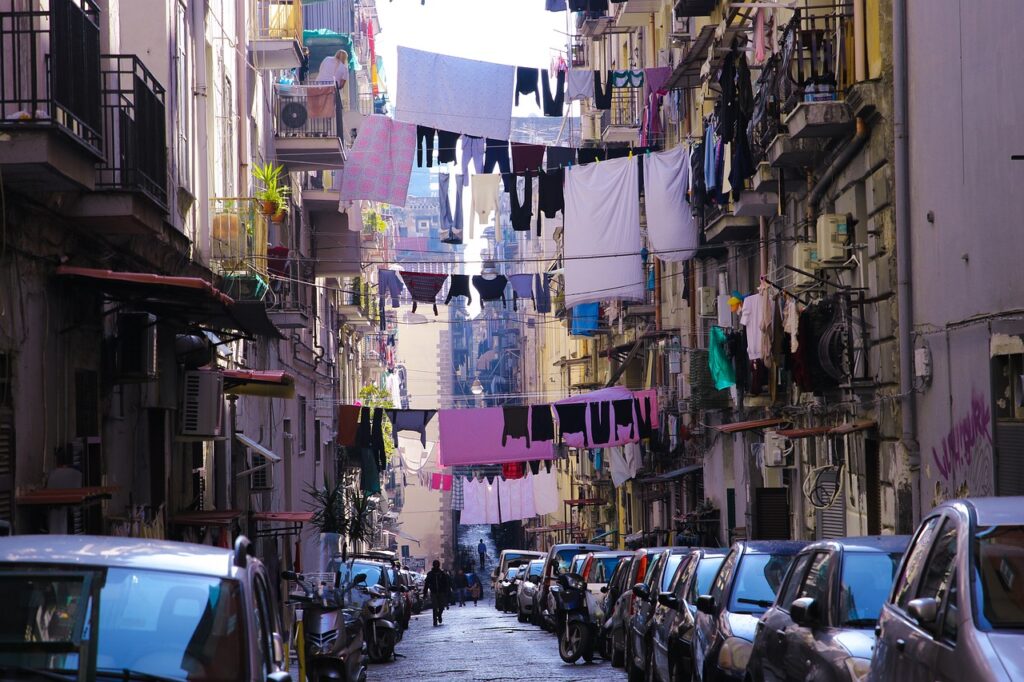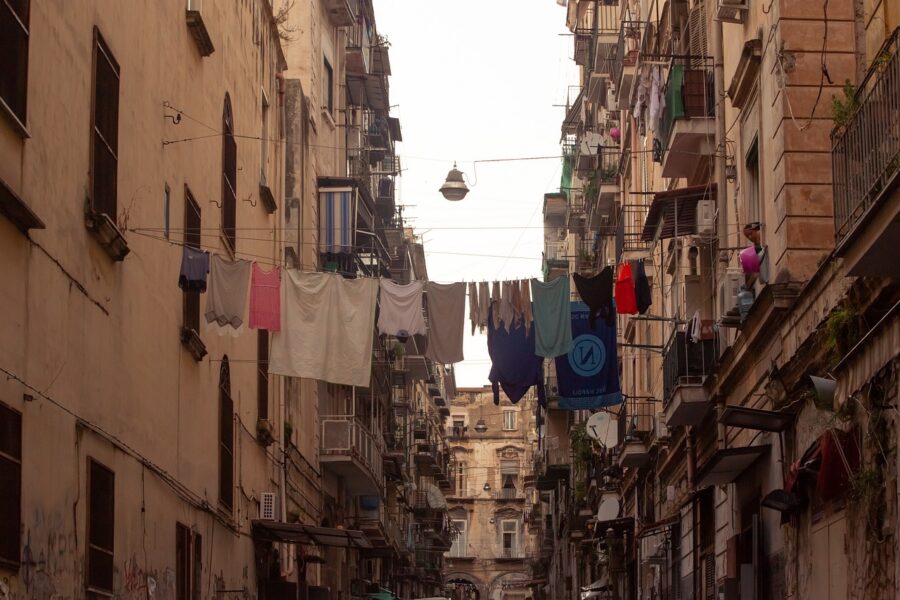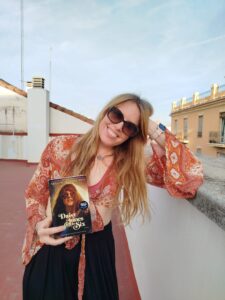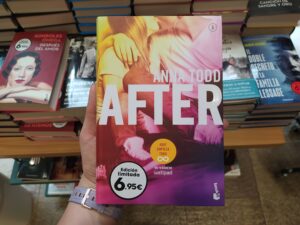“When the task we give ourselves has the urgency of passion, there’s nothing that can keep us from completing it.”
The Neapolitan Novels are a series of four novels: My Brilliant Friend (2012), The Story of a New Name (2013), Those Who Leave and Those Who Stay (2014) and The Story of the Lost Child (2015). The author of the series is Elena Ferrante (this is a pseudonym, her real identity is unknown). In this blog post, I’m treating the books as one novel because this is how the author sees them.
About the Neapolitan Novels
The Neapolitan Novels are a bildungsroman. The story is narrated by Elena Greco (also called Lenù), who talks about her life and her friendship with Raffaella Cerullo (Lila, sometimes called Lina). It starts with the girls growing up in a poor neighbourhood on the outskirts of Naples in the 50s. They’re both from poor families and have several brothers and sisters. Both are also very intelligent, good at school, love reading and dream of becoming writers and earning a lot of money one day. They love each other deeply, but they’re also competitive. The heroines’ relationship is complicated, but they’re there for each other, they think about one another constantly.
Besides Elena’s detailed storytelling, observations of the people in her life, her feelings for them and her struggles, goals and achievements, we also get to see what life was like in Naples in the 50s. Ferrante provides a very real picture of the poverty, violence and sexism she grew up in. She manages to do this without being sentimental, which makes it all the better.
A Review of The Neapolitan Novels
[spoiler]I loved all four books, even though the fourth did end kind of badly. Ferrante wouldn’t give us a happy ending just to please us, she’s too realistic for that. Tina’s and consequently Lila’s and Enzo’s faith is still pretty terrible, as is the fact that all the guys (Stefano, Rino, Rinuccio, Nino, even Pietro in some aspects) turned out much worse than they seemed as teenagers. The faith of some of the characters is just so sad: Lila’s, Tina’s, Enzo’s, Rino’s, Pinuccia’s, Gigliola’s, Franco’s … even Elena’s. She does succeed as a writer, she has her kids and grandkids. She, however, also ends up living alone, she has no partner after her marriage fails and Nino turns out to be a f*ckboy, her kids and grandkids are abroad and her best friend disappears without a trace.[/spoiler]
What I enjoyed the most about the books were the descriptions of Elena’s feelings and thoughts about other people, her own life and the world, the honesty and realness of her feelings for Lila and the descriptions of her. I also enjoyed the competitiveness between the two best friends. I feel like this is something that might feel wrong but that everyone experiences at some point and is probably just normal. Also, the portrayal of the neighbourhood and the people is very realistic. Ferrante really manages to show how hard life was, how poor and uneducated people were, how sexist the society was. When I think of this story, I imagine dust, sweat, yelling, crying babies, old classrooms, dirty hands and Elena and Lila reading. The novels are never over-descriptive or even slightly cheesy; they’re just real and lifelike.
Lila
[spoiler]What I disliked the most was not knowing what happened to Lila. Where did she go? Did she die? Does she live somewhere else in Italy, in another country? So many bad things happened to her that it’s just hard to accept it. Elena’s life wasn’t easy or perfect, but it was much better than Lila’s. Elena never had to endure a violent husband or rape, she managed to get a good education and fulfil her dreams. Lila never got to do any of that, and the girls’ dreams were very similar when they were kids. I like Elena, but I find Lila the most interesting. This is also why I sort of disliked the ending, I didn’t like not knowing what happened to her. She’s a brilliant character, as attractive to the reader as she is to Elena and the guys from the neighbourhood.[/spoiler] 
The TV series My Brilliant Friend
The series is beautifully shot and with great actors. The TV series Elena might not look exactly like the book Elena, but she’s still a good representation of the character. Lila looks exactly like she should, I think. I appreciate the fact that this series is actually shot in Italy, with Italian writers and actors (thinking of you, House of Gucci). To me they look so real, they’re not more beautiful, kinder or likeable than in the book. The best thing about the series is that it’s very faithful to the books and doesn’t leave any important stuff out. If you want to watch it, make sure you have the subtitles on even if you speak Italian (you’ll need them because a big part of the series is in Neapolitan).
Once the childhood part is over, teenage actresses Margherita Mazzucco (Elena) and Gaia Girace (Lila) replace child actresses Elisa Del Genio (Elena) and Ludovica Nasti (Gaia). They then appear as Elena and Gaia from early teenagehood until they’re almost in their mid-twenties. At that point, the actresses were still teenagers. In the third season, when they’re supposed to be in their thirties, Mazzucco definitely looks too young. Still, the replacement with older actresses (Alba Rohrwacher as Elena and Irene Maiorino as Lila) that awaits us in the fourth season will probably be shocking because we got so used to Mazzucco and Girace.
Are the Neapolitan Novels autobiographical?
Lastly, the million-dollar question. Of course, every novel ever written contains something the author experienced at one point in their life. Nevertheless, there’s a big difference between an autobiography and a novel. It’s also impossible to tell where exactly between the two the Neapolitan Novels stand. In an interview for the Paris Review, Elena Ferrante stated that she grew up on the periphery of Naples. She told The Guardian that she’s from a poor family, that she found it hard to climb the economic ladder and that she dealt with guilt about the people she left behind. These things happen to Elena Greco too, as does writing a book quickly and having it become a success. It’s not just Elena, it’s Lila too. Lila is such a fascinating character, from her personality to her looks and her life story. She feels so real and is described so precisely that I can’t believe she could be completely invented. I think that she’s heavily based on someone who actually existed.
What Ferrante says
When asked how much of Elena Greco’s story is autobiographical, Elena Ferrante told Corriere della Sera the following: “If autobiography intends to draw on its experience to nourish a history of invention, almost everything. If you’re asking me how much of the story is my very personal stories, nothing”. She also told the Vanity Fair that the friendship between Elena and Lila is inspired by her own long, complicated and difficult friendship with someone she met in her childhood. When speaking to the Paris Review, the author said: “the theme of female friendship certainly has something to do with a childhood friend of mine, whom I wrote about some time ago in the Corriere della Sera, a few years after her death. That’s the first written trace of the friendship between Lila and Elena”. This probably means that whoever Lila is based on is dead, which is very sad but not unexpected.
Memories or fiction?
The Neapolitan Novels are full of summaries and subjective impressions, but they don’t contain that many details or dialogue. Many scenes give the impression that they were taken straight out of the author’s memory. They don’t feel like they’re trying to “show not tell”; they mostly tell. When I was reading the books, I believed they were autobiographical. I think this actually made them even more enjoyable for me. Only after I read several articles about the books and the author, I became aware that it isn’t that simple.
I know this series isn’t for everyone and some people apparently even find these books boring. For me, however, they’re among the greatest books I’ve ever read!




